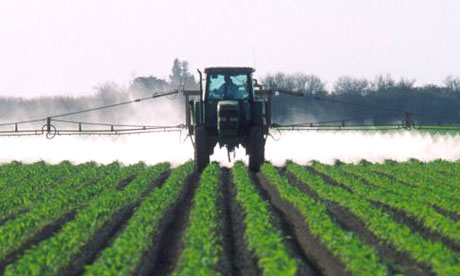Gardeners across Britain are reaping a bitter harvest of rotten potatoes, withered salads and deformed tomatoes after an industrial herbicide tainted their soil. Caroline Davies reports on how the food chain became contaminated and talks to the angry allotment owners whose plots have been destroyed
by Caroline Davies

Mass spraying of pesticides on farms, pictured here in Florida, is putting gardens at risk. Photograph: David R. Frazier/Alamy
Gardeners have been warned not to eat home-grown vegetables contaminated by a powerful new herbicide that is destroying gardens and allotments across the UK.
The Royal Horticultural Society (RHS) has been inundated with calls from concerned gardeners who have seen potatoes, beans, peas, carrots and salad vegetables wither or become grossly deformed. The society admitted that it had no idea of the extent of the problem, but said it appeared 'significant'. The affected gardens and allotments have been contaminated by manure originating from farms where the hormone-based herbicide aminopyralid has been sprayed on fields.
Dow AgroSciences, which manufactures aminopyralid, has posted advice to allotment holders and gardeners on its website. Colin Bowers, Dow's UK grassland marketing manager, told The Observer that links to their products had been proved in some of the cases, but it was not clear whether aminopyralid was responsible for all of them and tests were continuing. 'It is undoubtedly a problem,' he said, 'and I have got full sympathy for everyone who is involved with this.'
He said the company was unable to advise gardeners that it was 'safe' to consume vegetables that had come into contact with the manure because of pesticide regulations. 'All we can say is that the trace levels of aminopyralid that are likely to be in these crops are of such low levels that they are unlikely to cause a problem to human health.'
The Dow website says: 'As a general rule, we suggest damaged produce (however this is caused) should not be consumed.' Those who have already used contaminated manure are advised not to replant on the affected soil for at least a year.
http://www.guardian.co.uk/environment/2008/jun/29/food.agriculture








No comments:
Post a Comment